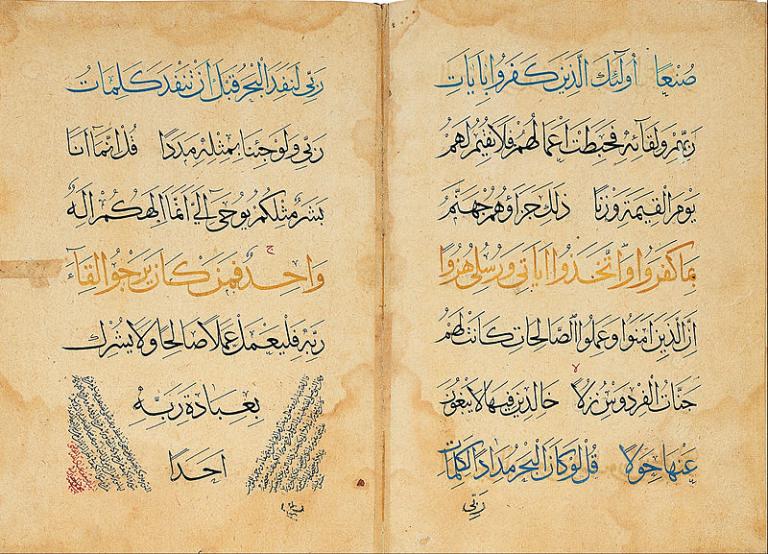
Wikimedia Commons public domain photograph
This Muslim emphasis on the words and style of the Arabic Qur’an was vividly illustrated for me once on a trip, many years ago now, to Cyprus. That island, of course, is divided between Christian Greeks and Muslim Turks. I found myself, one day, driving with my wife and others in the Turkish part of the island. It occurred to me that I ought to buy a Turkish translation of the Qur’an while I was there and use it to try to improve my understanding of that language. So I went into a small village bookstore that seemed likely and, after a while, emerged with what I thought was a Turkish Qur’an. I climbed into the car and, as we drove away, removed the wrapper and began to leaf through my new book. I was amazed at how much I could understand. Although it was in Roman letters (the alphabet that modern Turkish uses), it contained an astonishing number of Arabic words. In fact, once I was used to seeing them in my own alphabet, I realized that every single word in the book was Arabic! “What on earth?” I thought. For a few seconds, I was a bit upset. I had asked for a Turkish Qur’an, but had ended up only with a bizarre version of the familiar Arabic original. Then I realized that this was actually something quite important. This was the Arabic Qur’an put into letters that a Turkish Muslim could read; it would enable him to recite the Qur’an in its original language with something like the accurate sounds. He probably wouldn’t understand much of it, because if he knew Arabic he would be able to read it in the Arabic alphabet. (We would never produce such a volume in Mormonism. Can you imagine a Chinese transliteration of the Book of Mormon? Not a translation, mind you, but simply a rendering of the English sounds into Chinese characters so that uncomprehending members of the Church in Taiwan and Hong Kong could sound out English phrases like “I, Nephi, having been born of goodly parents”? It’s inconceivable.)
Muslims are virtually unanimous in insisting that the Qur’an cannot be translated. One devout English convert to Islam, a man who ended up with the improbable name of Mohammed Marmaduke Pickthall, put it this way in the foreword to his translation of the Muslims’ holy book:
The Koran cannot be translated. That is the belief of old-fashioned Sheykhs and the view of the present writer. The Book is here rendered almost literally and every effort has been made to choose befitting language. But the result is not the Glorious Koran, that inimitable symphony, the very sounds of which move men to tears and ecstasy. It is only an attempt to present the meaning of the Koran—and peradventure something of the charm—in English. It can never take the place of the Koran in Arabic, nor was it meant to do so.[1]
It was on the basis of such reasoning that Pickthall chose to call his translation, not “The Koran,” but The Meaning of the Glorious Koran. Other translators, such as the illustrious A. J. Arberry, have shown similar modesty in denying that what they have produced in English is actually the Qur’an. (Arberry’s version is The Koran Interpreted.) Instead, what they have given us, they say, is merely the basic meaning of the text. The intoxicating magic of the book’s language, its “poetry,” its powerful emotional impact, cannot be conveyed across the language frontier. In the Muslim view, there is saving value in reciting the actual words of God, spoken to Muhammad. And those words were in Arabic, not in English or Turkish or any other language. That is why a Turkish Muslim might value the book I found as a way of entering into the language of God himself, where meaning is only a fraction of the divine power.
[1] Mohammed Marmaduke Pickthall, translator, The Meaning of the Glorious Koran (New York: New American Library, n.d.), vii. Some of my own observations on the literary quality of the Qur’an appear in my “Editor’s Introduction: By What Measure Shall We Mete?” in Review of Books on the Book of Mormon 2 (1990): vii-xxvi.
***
The new academic year is about to begin, an odder one than any of us have ever experienced, and I’m scheduled to teach three courses, on (1) the religion of Islam, (2) the humanities of Islam, and (3) classical Arabic literature. I’ve been teaching such subjects, and writing and speaking on them, for decades.
In that light, it’s bizarre but true to form that my Malevolent Stalker is once again publicly claiming (and that at least some of his chorus of gullible groupies are singing harmony with him) that I characteristically denigrate and demean the religious faith of others, that I hold non-Latter-day Saint religious beliefs and religious believers in resentful disrespect, and that I even hope to inflict “pain” (his word) on those who don’t share my religious beliefs.
The sheer hateful dishonesty of his accusation is breathtaking. And it is dishonest. My Malevolent Stalker has been on a crusade against me for roughly fifteen years. Among other things, he follows this blog obsessively, every day, looking for material that he can weaponize against me — and mines IRS records looking for dirt on me, and pores over my little son’s Amazon wish lists from years back, and combs through obscure blogs looking for mentions of me, and probably examines the trash in my garbage cans during the middle of the night — so he’s definitely aware of such entries as this one, from 19 June 2020:
“My sorry career as a religious bigot”
The truth is not in him.










